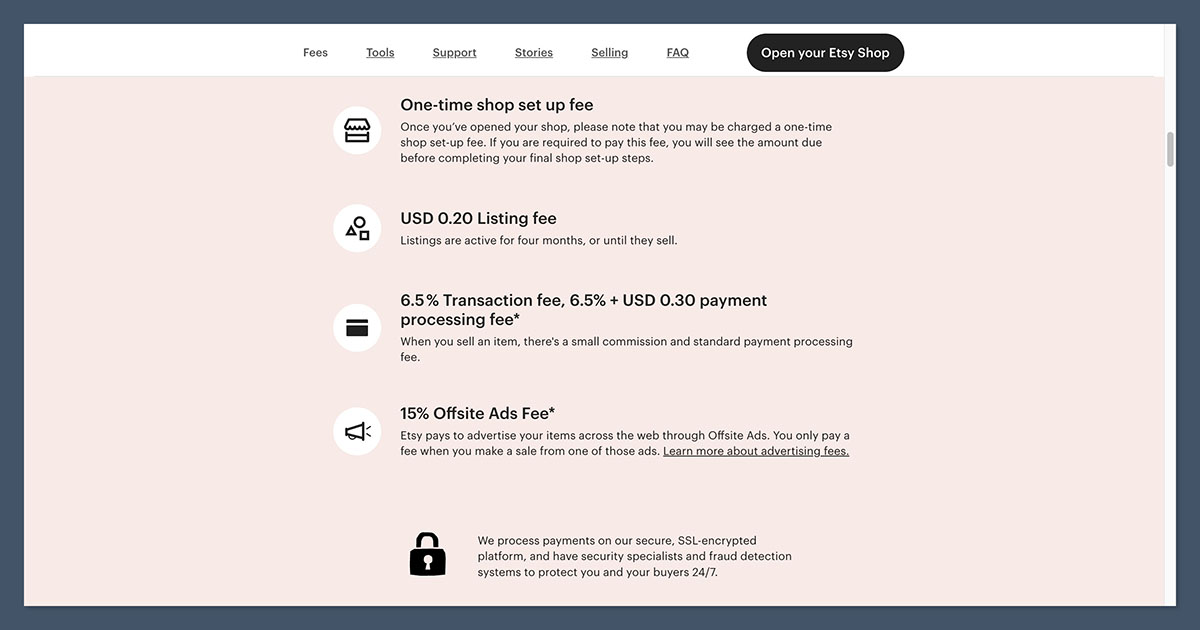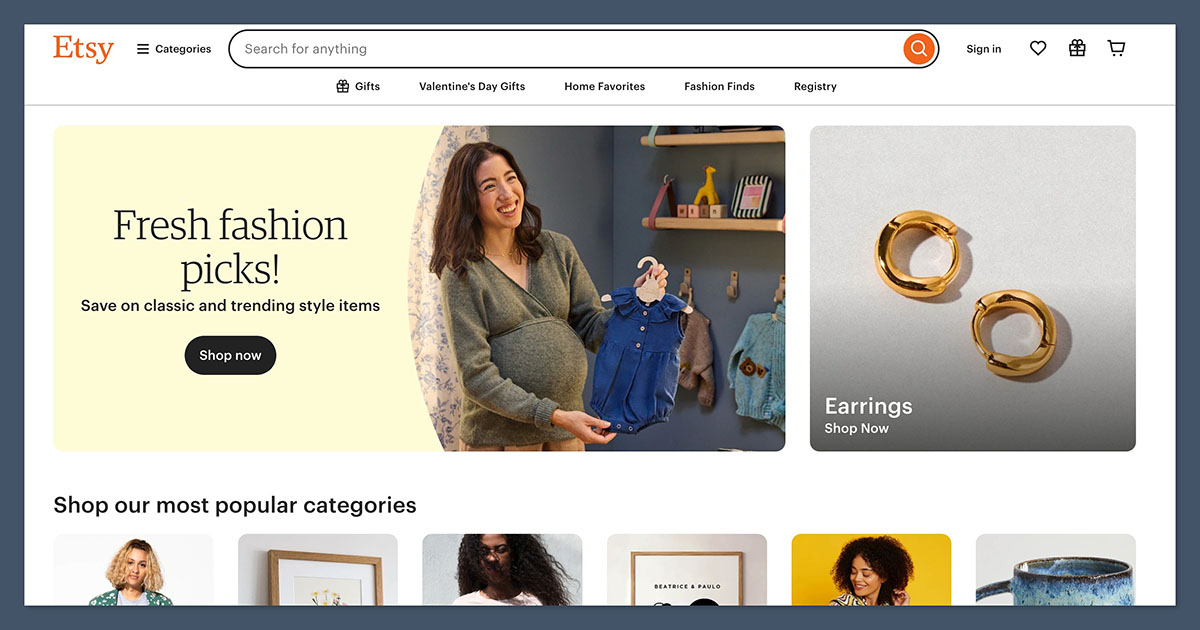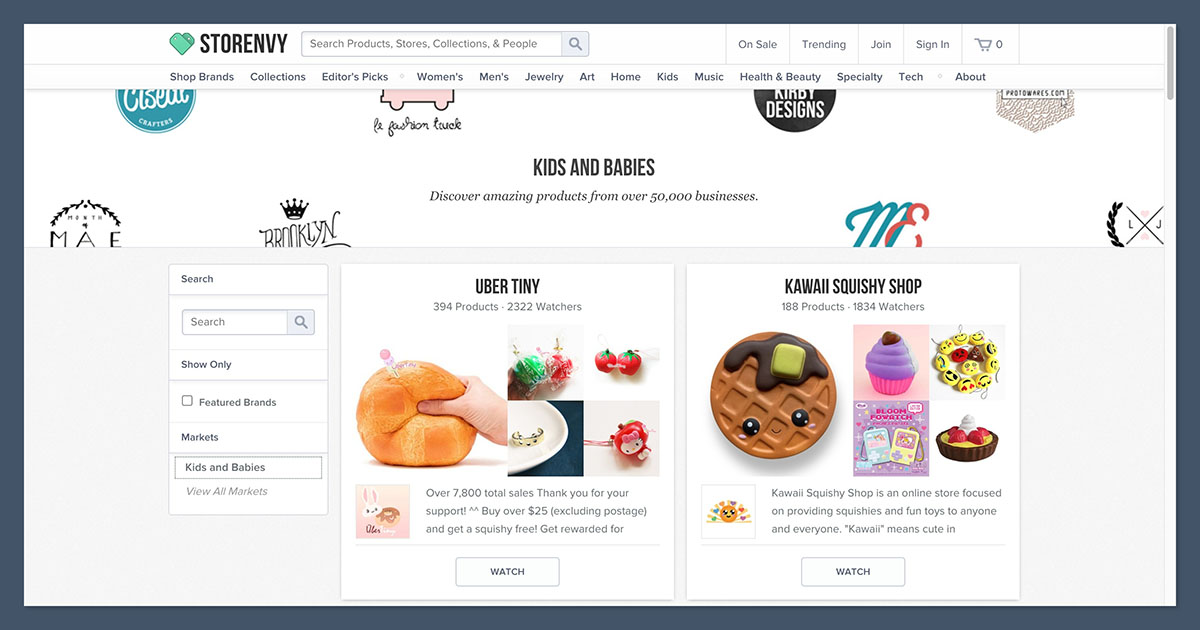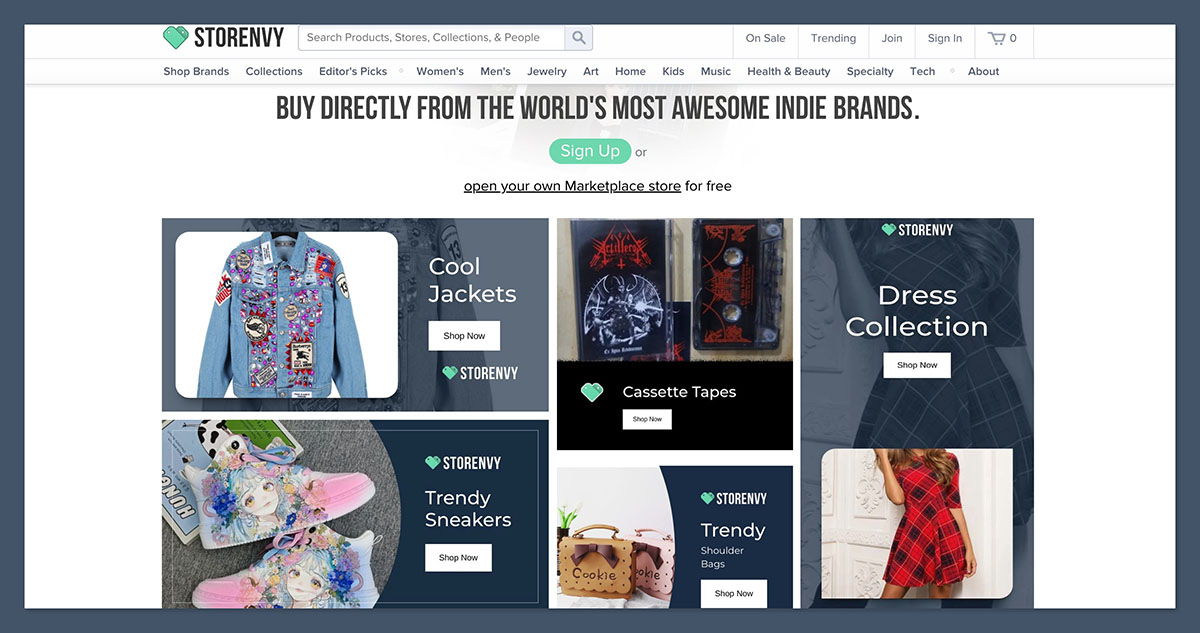If you’re looking for quick results and instant exposure, Etsy is the better choice because of its huge built-in audience and SEO advantages.
It’s ideal for handmade, vintage, and craft sellers who want a plug-and-play marketplace with high traffic.
Storenvy, on the other hand, is for sellers who want full branding control and lower fees—but it requires driving your own traffic through social media, SEO, and paid ads.
If you already have an audience or are willing to market your store aggressively, Storenvy lets you keep more of your profits and build your own brand.
Let’s break down the key differences so you can choose the right platform for your business.
Etsy vs Storenvy: Quick Breakdown
Etsy vs Storenvy: Quick Breakdown
| Feature | Etsy | Storenvy |
|---|---|---|
| Built-in Audience | Yes, 90M+ buyers | No, you drive your own traffic |
| Listing Fees | $0.20 per item | None (for standalone store) |
| Transaction Fees | 6.5% + 3-4% processing | Only PayPal/Stripe fees (except marketplace) |
| Customization | Limited, Etsy-branded | Full store branding |
| Payouts | Can be delayed for new sellers | Instant with PayPal/Stripe |
| SEO & Visibility | Ranks well in Etsy & Google search | Requires SEO & marketing effort |
So, which one makes sense for you? Let’s dig in.
1. Fees & Costs: Who Takes the Bigger Cut?
Fees can make or break your profit margins, and Etsy is known for stacking them up.

Every time you list a product, there’s a $0.20 listing fee, whether it sells or not.
Then, they take a 6.5% transaction fee on every sale and another 3-4% payment processing fee. If you run Etsy Ads, that’s an extra cost eating into your revenue. These fees add up fast, especially for low-cost items.
Storenvy, on the other hand, works differently.
If you run your own standalone store, there are no listing fees—you keep everything you make.
But if you choose to sell through their marketplace, there’s a 15% commission fee on each sale. This means Storenvy is cheaper if you bring in your own traffic, but can be just as expensive as Etsy if you rely on their marketplace.
So, if you’re just starting out and want free exposure, Etsy might make sense despite the fees.
But if you already have a customer base or are willing to market your store yourself, Storenvy lets you keep more of your earnings.
2. Traffic & Visibility: Which Gets You More Customers?
If you want instant exposure, Etsy wins by a landslide.

It has millions of active buyers searching for products every day. People trust Etsy, which means they’re more likely to buy from new shops. Even if you don’t have a huge marketing budget, your products can still get discovered through Etsy’s search algorithm.
Storenvy doesn’t offer the same level of built-in traffic. While they do have a marketplace, it’s nowhere near as popular as Etsy’s.
If you’re not actively promoting your store, you won’t get many visitors. This means you’ll need to focus on SEO, social media marketing, and paid ads to bring in sales.
So, if you want a plug-and-play solution with an existing audience, Etsy is the better choice. But if you prefer building your brand independently, Storenvy gives you more flexibility.
Why Storenvy Sellers Must Drive Their Own Traffic (Unlike Etsy)
Storenvy is technically a marketplace, but it doesn’t work like Etsy.
While Etsy brings in millions of shoppers every month, Storenvy’s marketplace has far less built-in traffic. That means most Storenvy sellers don’t get organic sales unless they actively promote their store.
If you’re considering Storenvy, here’s why you’ll need to focus on marketing to make consistent sales.
Storenvy’s Marketplace Isn’t as Popular as Etsy
Etsy dominates the handmade and vintage eCommerce space, with over 90 million buyers browsing the platform. Storenvy, on the other hand, has a much smaller audience, meaning fewer people naturally discover your products.
| Feature | Etsy | Storenvy |
|---|---|---|
| Monthly Visitors | 400M+ page views | Limited data, but significantly lower |
| Global Recognition | Well-known, trusted brand | Lesser-known, niche platform |
| Organic Search Visibility | High – Etsy products rank well on Google | Low – Less Google visibility |
If you list your products on Etsy, there’s a good chance they’ll be discovered. On Storenvy, you can’t rely on their marketplace alone—you’ll need to bring your own customers.
The Two Selling Options: Standalone Store vs. Marketplace
Storenvy offers two ways to sell, and each works differently:
Standalone Store (Custom Domain)
- No listing fees
- You get your own branded storefront
- Does NOT get traffic from the Storenvy marketplace
- You must market it yourself (SEO, social media, ads)
Storenvy Marketplace
- Products appear in Storenvy’s general store
- 15% marketplace fee per sale
- Small buyer base → Limited exposure & fewer sales
Many Storenvy sellers assume that listing products in the marketplace means automatic sales, but that’s rarely the case. Since Storenvy’s marketplace is not as large as Etsy, sellers still have to promote their products to generate traffic.
3. Customization & Branding: Who Gives You More Control?
Etsy is great for selling, but branding? Not so much. Every shop looks nearly identical, with the same layout and Etsy branding.
You can upload a banner and logo, but that’s about it. Customers always know they’re shopping on Etsy, not in your personal store.
Plus, Etsy controls everything, from your shop’s policies to the checkout process.
Storenvy is the opposite. It lets you create a fully branded online store, complete with your own domain name, custom design and independent checkout process.
This makes your business look more professional and legitimate, rather than just another Etsy seller.

If you want a simple setup and don’t care about branding, Etsy works. But if you want to build a recognizable brand that stands on its own, Storenvy is the better choice.
4. Payment Processing & Payouts
Getting paid should be simple, but with Etsy, it isn’t always.
They use Etsy Payments, which means they control how and when you get your money.
New sellers often face payout delays, and Etsy can hold your funds if they detect any unusual activity. This can be frustrating if you rely on sales for cash flow.Storenvy keeps things straightforward.
They use PayPal and Stripe, so customers pay you directly. There’s no middleman controlling your money, and you don’t have to worry about random payout delays.
You get your money instantly, which is a big advantage if you need quick access to funds.
If fast and reliable payouts matter to you, Storenvy is the way to go.

But if you’re okay with waiting for Etsy to release your funds, it might not be a dealbreaker.
MORE: Shopify vs Etsy – Which one is Better for Print on Demand
5. SEO & Marketing: Which One Helps You Rank?
Etsy gives you a huge SEO boost.
Since their site has high domain authority, your listings can rank in Google searches with minimal effort.
Plus, Etsy has its own internal search engine, meaning customers can find your products without you doing much marketing.
If you use strong keywords, your products can show up in Etsy’s search results and bring in consistent sales.
Storenvy doesn’t have that advantage. Since your store runs on a separate domain, you have to build up SEO from scratch.
That means optimizing product descriptions, building backlinks, and creating content to drive organic traffic. If you’re not experienced with SEO or willing to invest in marketing, it can be tough to get noticed.
If you want a hands-off SEO boost, Etsy is the clear winner. But if you’re willing to put in the effort to build long-term traffic, Storenvy can be a great investment.
Pros & Cons: Quick Recap
Etsy Pros
- Built-in traffic & search visibility
- Huge buyer trust & reputation
- Easy for beginners
Etsy Cons
- High fees (eats into profits)
- Limited store customization
- Etsy can suspend shops without warning
Storenvy Pros
- No listing fees
- Full control over branding & storefront
- Faster payouts
Storenvy Cons
- No built-in audience (must market yourself)
- 15% marketplace fee (if using their marketplace)
Which One Should You Choose?
Choose Etsy if…
- You want ready-made traffic
- You sell handmade, vintage, or craft supplies
- You don’t mind paying higher fees
Choose Storenvy if…
You have your own following
- You prefer less fees & quicker money
Try them out.






